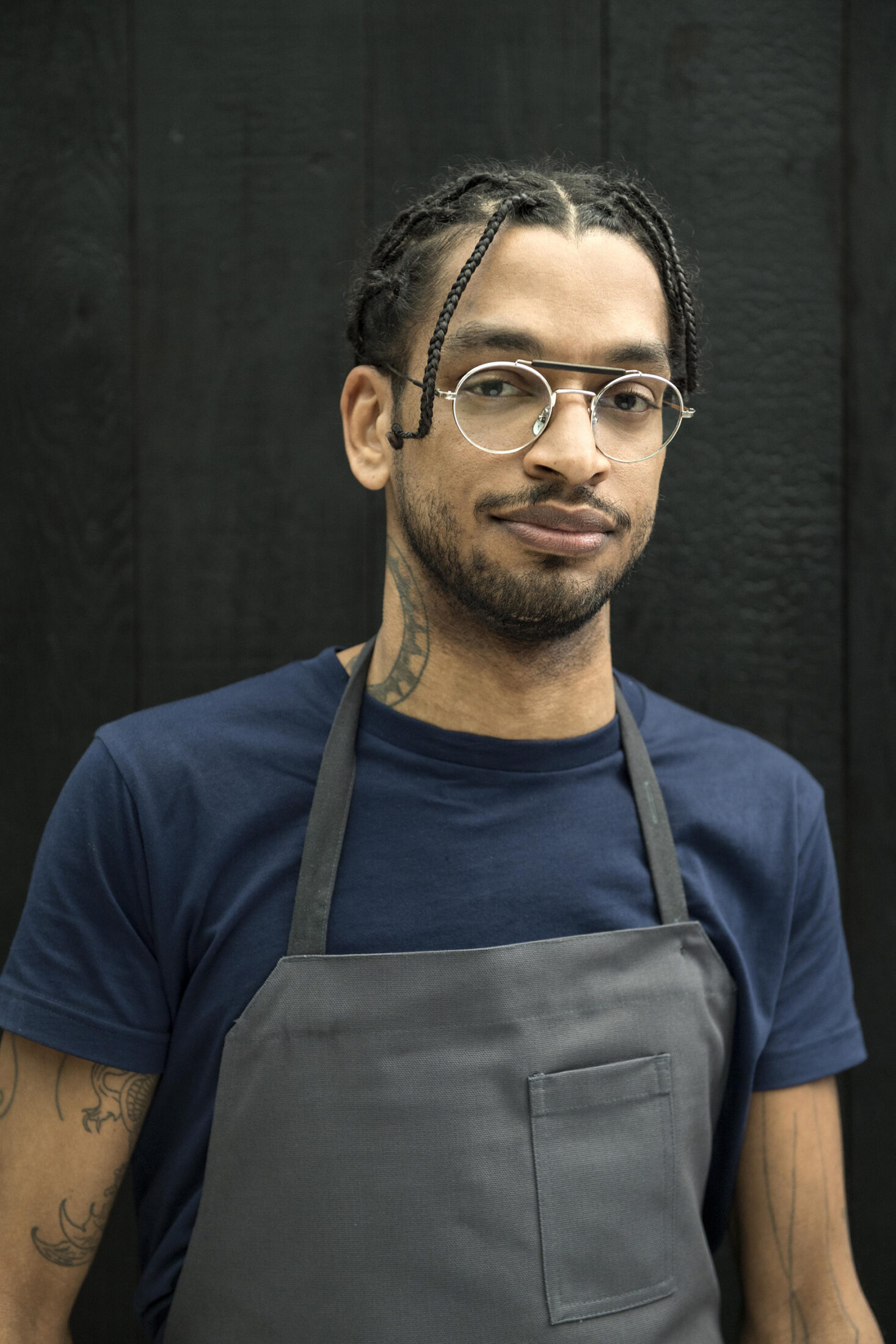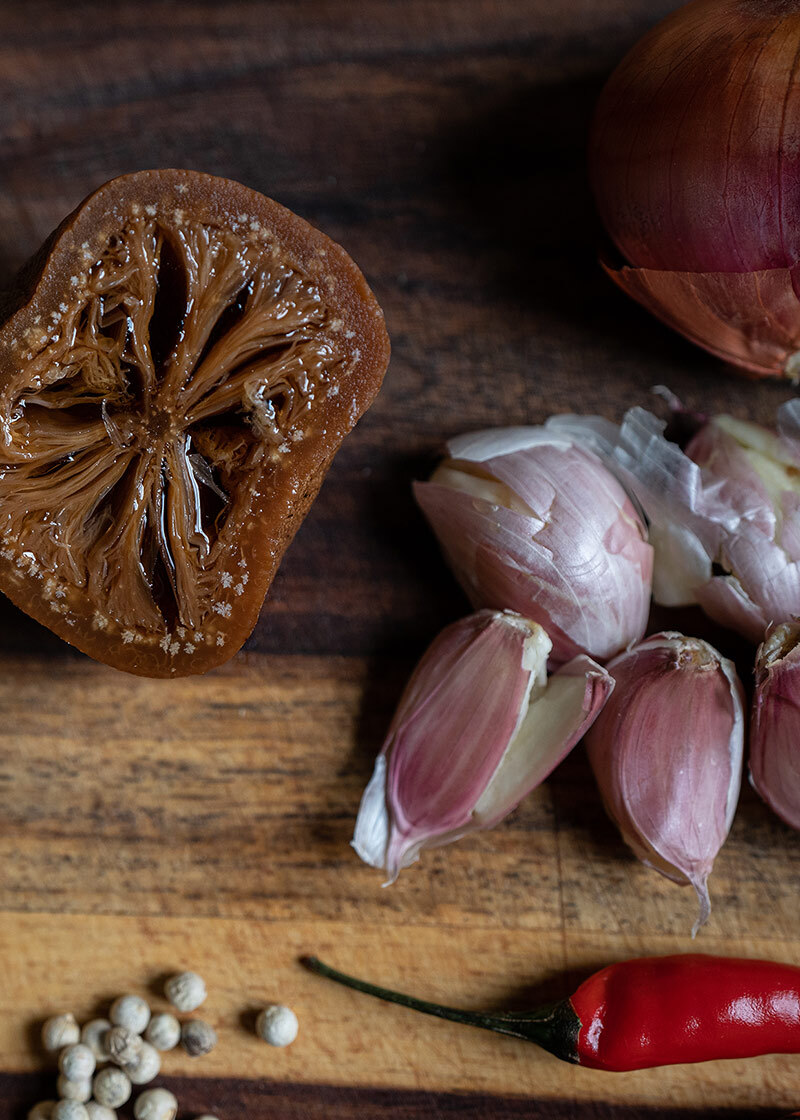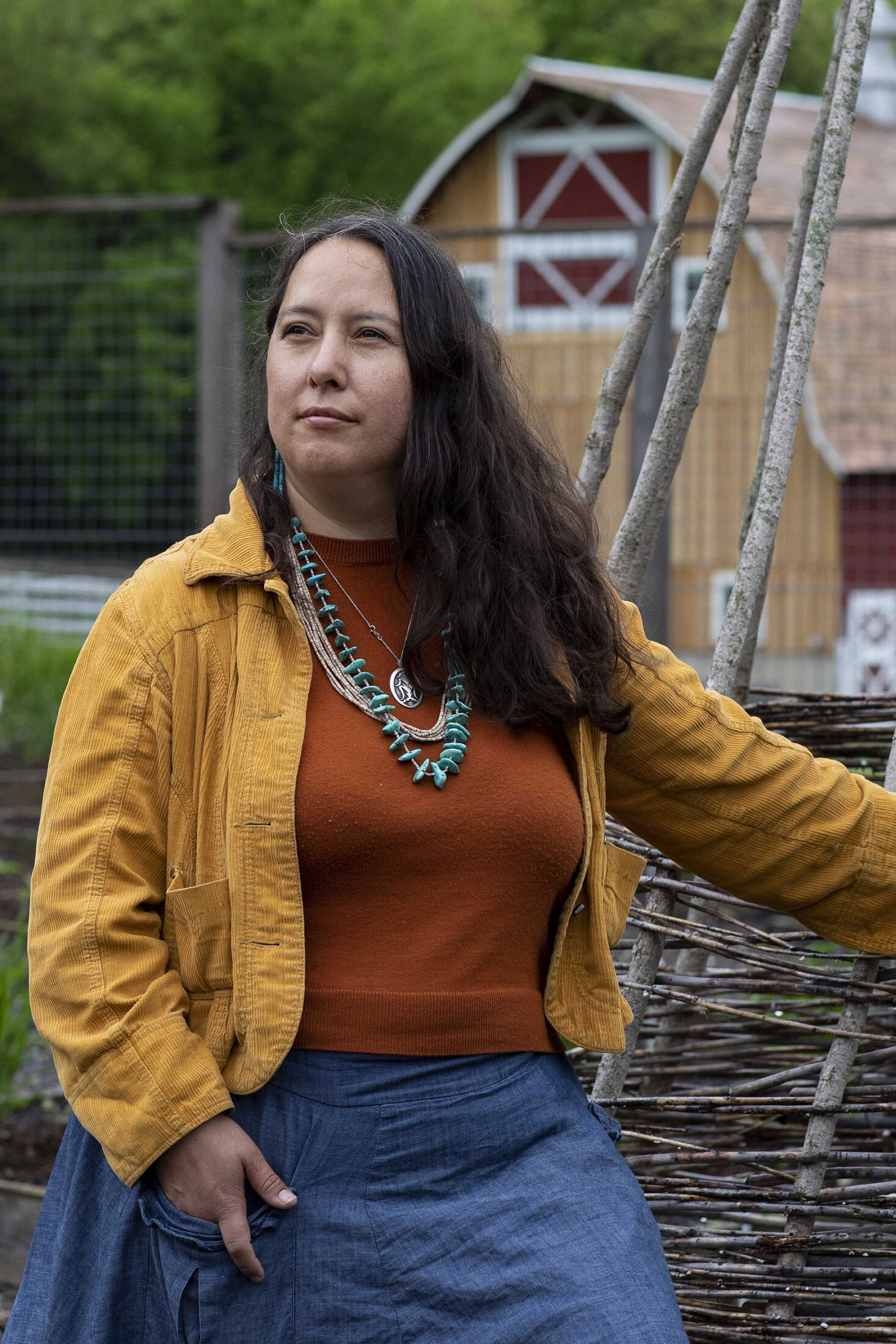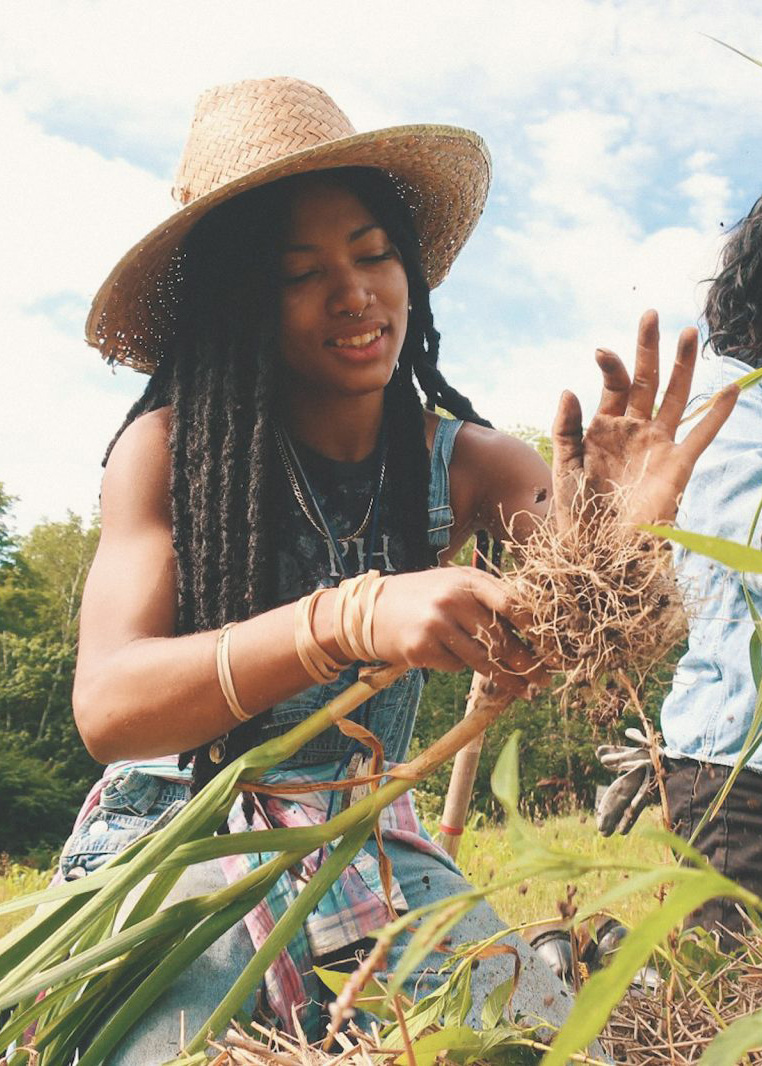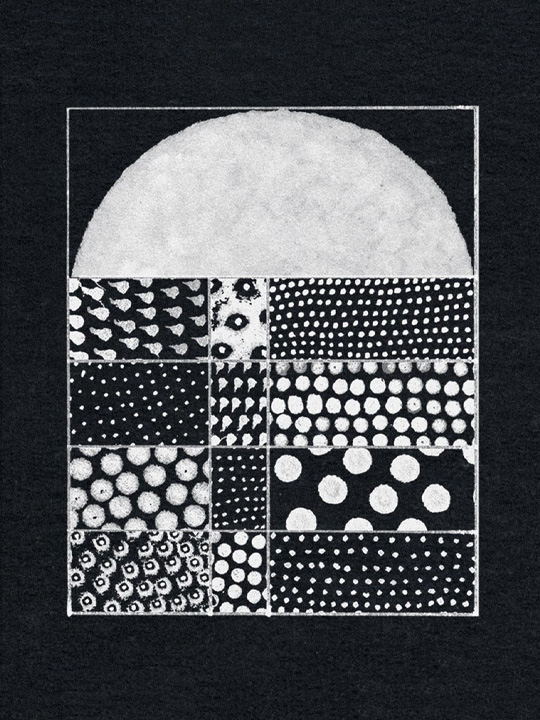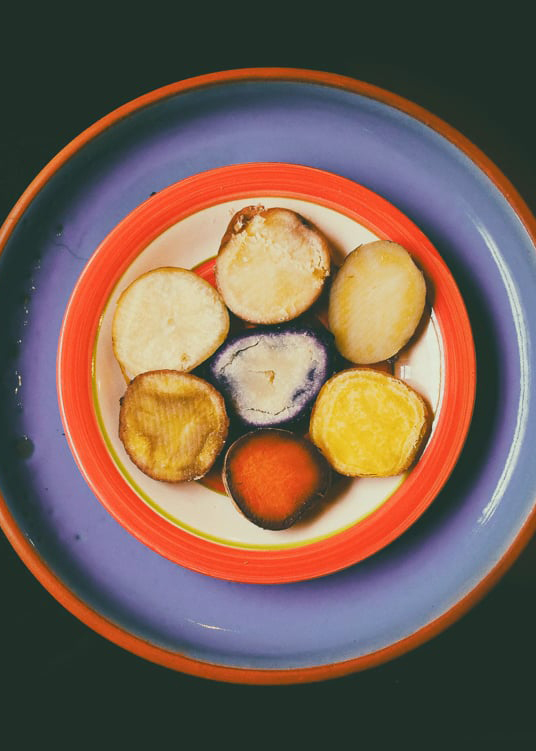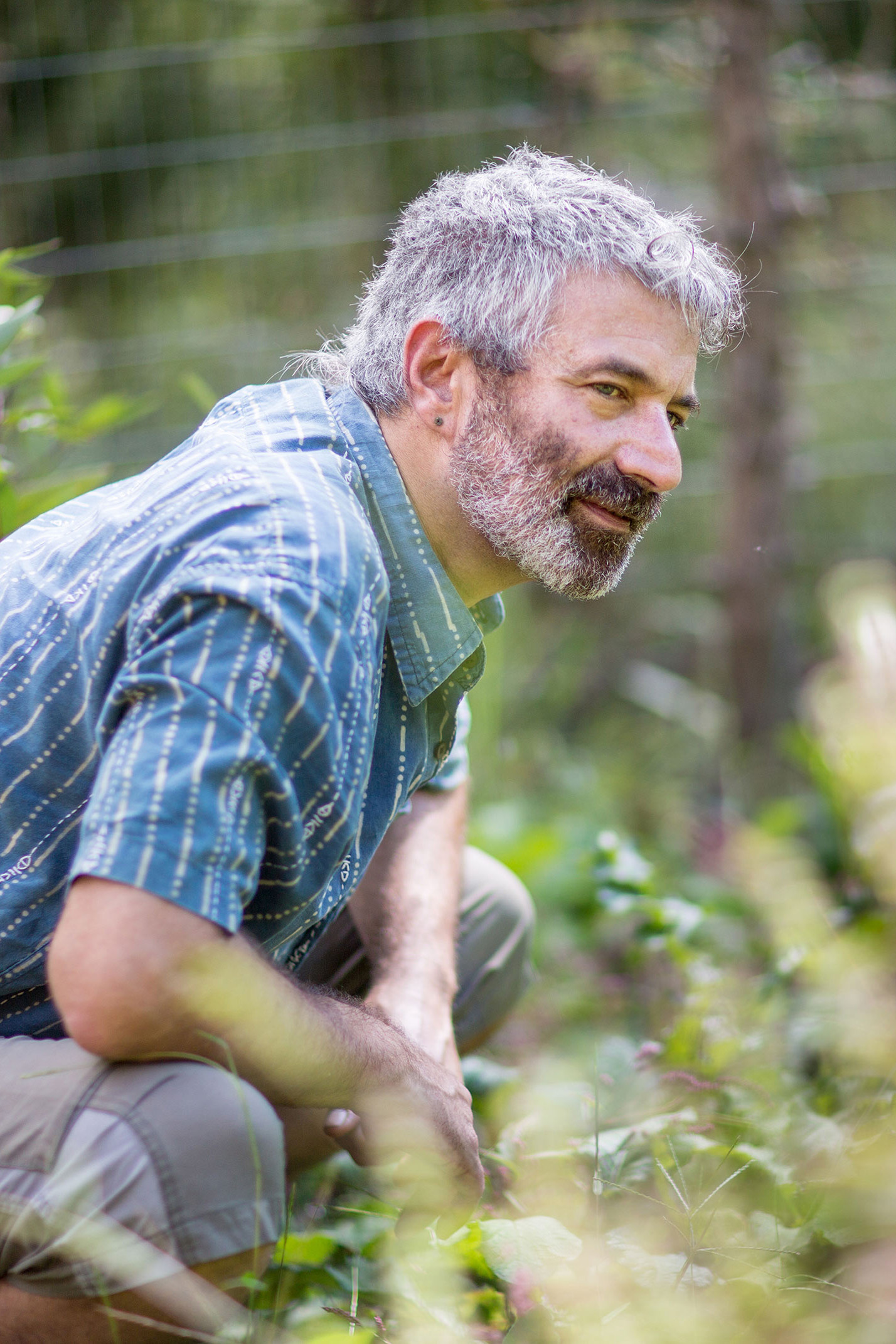
Fermentation as Metaphor
Sandor Ellix Katz is a self-taught experimentalist who lives in rural Tennessee. He is the author of Wild Fermentation and The Art of Fermentation, winner of the James Beard Award and a finalist at the International Association of Culinary Professionals. Sandor is the recipient of the Craig Clairborne Lifetime Achievement Award from the Southern Foodways Alliance. He and his work have appeared on NPR’s “Fresh Air with Terry Gross,” The New Yorker, The New York Times, The Guardian, PBS, The Washington Post, and The Financial Times.
Emmanuel Vaughan-Lee is an author, Emmy- and Peabody Award–nominated filmmaker, and a Sufi teacher. He has directed more than twenty documentary films, including Taste of the Land, The Last Ice Age, Aloha Āina, The Nightingale’s Song, Earthrise, Sanctuaries of Silence, and Elemental, among others. His films have been screened at New York Film Festival, Tribeca Film Festival, SXSW, and Hot Docs, exhibited at the Smithsonian Museum and London’s Barbican, and featured on PBS POV, National Geographic, The New Yorker, and The New York Times Op-Docs. His new book, Remembering Earth: A Spiritual Ecology, is forthcoming from Shambhala in summer 2026. He is the founder, podcast host, and executive editor of Emergence Magazine.
In this interview, Sandor Katz discusses his new book, Fermentation as Metaphor. A world-renowned expert in fermented foods, Sandor considers the liberating experience offered through engagement with microbial communities. He shares that the simple act of fermentation can give rise to deeply intimate moments of connection through the magic of invisible forces that transform our foods and our lives, generation by generation.
Transcript
Emergence MagazineYou describe yourself as a fermentation revivalist so I wonder if we could start by having you share a bit about what that means to you.
Sandor KatzWell, sure. The reason I started calling myself a fermentation revivalist is from my sense of how common fermentation has been in the not too distant past and it’s so integral to all of our food traditions. Whatever part of the world our ancestors came from, fermentation is an essential part of how people make effective use of whatever food resources are available to them, but in the last several generations and at different paces in different parts of the world, people have become increasingly distanced from the production of food and all of the processes that we use to transform the raw products of agriculture into all of the foods that people eat and drink. And it so happens that the same time period where these processes became more mysterious and distanced to people is also the time when the war on bacteria developed. People developed this fear, projected all of their fear of bacteria onto these ancient and important transformative fermentation processes. So when I call myself a fermentation revivalist, it’s about demystifying the process of fermentation, getting people comfortable with it, and encouraging people to familiarize themselves with processes that are extremely important but have become mysterious for people.
EMYou’ve said that fermentation is a form of activism and that fermentation, at least when it’s the do-it-yourself form of fermentation, is a radical act. So, what makes it so radical?
SKI would say that more broadly than fermentation, in the context of our contemporary food system where we’re really encouraged to just be passive consumers and meet our needs at the supermarket, that any direct involvement in the production of food is subversive and is radical. So it’s not that I think that there’s anything intrinsically radical about the process of fermentation, but that in the context of our current food system, bypassing this sort of centralized system of production, and sort of finding some direct connection for ourselves. Because producing food requires interaction with the soil, with the organisms of the soil, with plants, with animals, with bacteria, with fungi. So that’s the aspect of it that I would consider to be a radical act.
EMWhat about the activism component of that and especially in response to the system you’re describing.
SKI mean it’s activism really only because of this pervasive system of mass production of food, which I would regard as just completely unsustainable, for so many reasons. Number one is the products are nutritionally diminished; they’re wasteful. As the pandemic has really illustrated, our centralized systems of food production and distribution are very vulnerable. There’s all sorts of ways that this system can become interrupted whether it’s a spike in energy prices, whether it’s war, whether it’s natural disasters.
And so I think, in terms of thinking about food security, it’s really incumbent upon people in every region of the world to think about developing and increasing productive capacity in terms of food. And I think that local and regional food production is a form of activism. In my travels I’ve met incredible activists in many parts of the world who are reimagining and reinvigorating local and regional food production, as well as processing. Growing food is one aspect of it, but then turning the products of agriculture into the foods and beverages that people actually eat and drink every day is another. I think that that’s definitely activist work or it can be done in an activist spirit and it often is done that way.
EMYou talk about reinvigorating and returning, and one thing that really struck me when I first came across your work and read The Act of Fermentation was the broader invitation you were articulating to reclaim a relationship, not only with food production, but with traditions and communities and ultimately with the living world through the simple act of fermentation. I wonder if you could talk a bit about what you mean by reclaiming and the ways you see it taking form.
SKEvery organism’s food is a manifestation of its interaction with its environment. Humanity has decided that we are going to transcend this relationship, which every other kind of organism has with its environment, and we’ve created these elaborate systems of centralized mass production and distribution that supposedly have liberated us. I can certainly see ways in which people have been liberated by not having to spend all of our time procuring the food resources to get us through the day but something has also been lost. I think that many of our biggest problems relate to the ways in which we have become so distanced from our environment.
Whenever anybody gets involved in producing even a tiny proportion of the food they’re going to eat for themselves it forces them to pay attention and become more intimately connected to all of these environmental factors. Producing food forces us to become more connected to the weather, the insects that are around us, just so many aspects of the world that are right there but it’s so easy for us to ignore them because they don’t seem like they’re directly relevant to our life and to our experience even though they are.
So taking an issue like climate change, the more connected you are to your environment, the more you’re going to notice things that are changing. The more you get out of an air-conditioned car and into an air-conditioned house, the less relevant the environment is to your direct experience. So reclaiming our food is reclaiming much more than our food. It’s reclaiming this huge set of relationships that ultimately connect us to the land and to the biological web that we are part of.
EMYou talk a lot about cultivating these relationships, both literal in the sense of cultivation as the primary aspect at the core fermentation, but also in a metaphorical sense, which leads us into what your new book is focused on, which is the metaphors that fermentation evokes. So maybe we could start by having you talk about cultivation in the broadest sense as a metaphor.
SKI would say it’s not even just as a metaphor. “Cultivation,” “culture,” these words—our sense of what we can cultivate maybe has changed over time but this word that sort of originates with cultivating the land in order to grow crops has so many more broader applications. We cultivate certain values in our children that we want to manifest in the next generation. Culture is any information that we pass down from generation to generation, so whether that is the language and the meaning of the words that we’re using or our values or belief systems.
Or very practical information: how do you grow carrots? How do you grow squash? What is the season? When do you plant those seeds? When do you harvest those? How do you cook those? How do you ferment them? All of this is cultural information and it’s not that any of it is, in terms of cultivation, none of it is metaphorical. I mean it’s all important things that we’re seeking to pass down from generation to generation that are outside of our genes.
And of course we talk about yogurt cultures and introducing a culture in the ferment. So in the cultivation of microorganisms on our food—which is what we’re doing in fermentation—we use the same word, “culture,” to describe the community of bacteria that turn milk into yogurt that we use to describe language, belief systems and the totality of what we’re trying to pass down generation to generation.
EMIn your new book, Fermentation as Metaphor, you’re really talking about fermentation as a metaphor for societal change, cultural changes, political changes, economic issues, and you’re even exploring spiritual perspectives of looking at our relationship to each other and the living world. I was really intrigued that you start the book by talking about how in fermentation there are no absolutes, no black or white, and so that was really intriguing and I wonder if you could speak to that a bit.
SKReally the way I came to this is when I first became interested in all things fermented, which would be about 1993 when I made my first sauerkraut and miso and started getting very interested in all things fermented. But every now and then, I would notice in some article that I was reading, let’s say an article about jazz music, a certain place and time being one of great musical fermentation; I saw references to artistic fermentation; I saw references to spiritual fermentation; I saw references to political fermentation. I learned that the word “fermentation” comes from the Latin word fervere, which means “to boil,” and so prior to science settling on an understanding of fermentation as the transformative action of microorganisms, people recognized fermentation by the bubbles.
If you ferment pressed grape juice into wine you’re going to see bubbles developing as the fermentation comes to life. With any liquid that you ferment, bubbles are going to be a manifestation of the fermentation. So it was recognized always as a form of, let’s call it “cold boiling,” and as an extension of that—at least in the English language, not really in every language—people started using fermentation in a metaphorical sense. Any time things were getting bubbly, things were excited or excitable, that could be a manifestation of fermentation. I’m finding, through the Oxford English Dictionary, literature citations from 400 years ago referring to different things as forms of fermentation, such as religious fervor as fermentation. There’s a long tradition in our language of using fermentation in this metaphorical sense.
In this book I’m reflecting on this. I’m trying to explore this more fully and then also explore some of the concepts that I find people frequently projecting onto the idea of fermentation. Specifically, purity and contamination, people assuming that you need to sterilize everything. You have to have a pure blank slate in order to introduce the organisms that you want to grow, which really is contrary to the reality. I mean, in general, the organisms of fermentation are found on the foods that we’re fermenting and it’s just a matter of creating a selective environment to encourage the growth of the organisms that we want while simultaneously discouraging other organisms. But generally you’re not working with a blank slate at all.
In the microbial world, there is no purity. That’s totally a human construct. In a lot of commercial winemaking, you might use little chemicals to sterilize the grape juice and then you can introduce the single strain of yeast that’s been propagated into that. But that’s a real departure from the long history of winemaking that just works with the large group of organisms that are there.
And then also the contrasting concept is contamination. Everyone’s always freaking out with their fermentation, wondering: how do I protect it from contamination? But contamination’s everywhere. Everything is contaminated, so it’s really about encouraging enough growth of the organisms that are producing let’s say the acids which are going to protect it from the random growth of other organisms on it. So purity is impossible and contamination is inevitable. And even with those factors fermentation has been practiced in every part of the world for thousands of years.
EMYou talk about how the fear of contamination, which you describe as inevitable, supports this state of separation and the fear of the other.
SKIn our human societies, this idea of protecting the purity of our society against the contamination of outside ideas is, well, it’s been weaponized really. The way people project fear of the “other” has been such a theme throughout human history. With all these metaphors that we’re picking up from fermentation, we can look and see how they have been applied in our society and our culture and our politics.
EMIn your experience working for a quarter century now with people who are interested in fermentation, what have you noticed when they actually start engaging with this physical act of fermenting foods as far as how it changes their ability to perceive the other differently?
SKYeah. I mean it’s interesting. I mean it’s hard to say that a person’s fermenting leads to a particular outcome in terms of their outlook. One thing I hear often from people is it’s making them more aware of invisible forces that are continually at work. When you’re focusing on your little jar of vegetables that’s fermenting and you can’t see any of the bacteria and yet you begin to see changes. You begin to notice bubbles, maybe you begin to notice a little growth developing on the surface, which is very common.
It forces you to pay attention in different kinds of ways and people carry this beyond the kitchen where they’re fermenting in terms of maybe keener sensibilities. But in terms of outlook, of looking at other people, I don’t think it necessarily leads people in any particular direction.
EMIn both your previous work and especially the new book, you talk about the mystical dimension of fermentation: the beauty of the unseen and working with mystery, which you describe as also what appeals to people; the way they tap into that broader unknown with a sense of what’s possible and out there. I was really intrigued because this is not what you usually imagine when you think of fermentation, this mystical sensibility.
SKWell, it is very mystical. For us right now, in this period science has some understanding of what’s going on, but historically fermentation has been such a mystery that it’s been really seen in many contexts as something quite literally divine. And there’s a huge amount of ceremony and ritual organized around fermentation. We can even look at some of the major world religions to see iconography related to fermentation. In the Roman Catholic mass it’s not some random substance that transubstantiates into the blood of Jesus Christ, it’s wine, and wine is this sort of magical transformation. That’s just one example.
I think visiting people living in more traditional kinds of societies—I was in a village in China and this woman who was making rice alcohol, she took a little cluster of chili peppers and did a little incantation on top of it as she set the fermentation in place to ferment. It was to try to protect the ferment and bring it vitality. Around the world there’s been a huge amount of mythology and ceremony and ritual around fermentation and it’s always been viewed as something mystical and magical.
EMYou’re talking about the historical significance of fermentation and cultures and religions and spiritual spaces, but the beauty of the unseen is also something that transcends any sort of specific tradition and is something that people could participate in now so—
SKOne thing I would say is even knowing, ”Okay, there are cells of Leuconostoc mesenteroides on the vegetables and they’re going to initiate—” I know this fact, that the microbiologists and the botanists say, that the cells that are initiating the fermentation are there, but there’s still something very mystical about watching it.
You shred the vegetables and salt them and get them submerged under their own juices and it doesn’t start immediately. It takes some patience. You wake up the next morning and you look at it wondering, “Are there any signs that it’s coming to life yet?” I feel like even for me, after doing this for twenty-seven years, every time I start a ferment it’s this huge exciting moment when I can see that it has to come to life. I mean it’s a little bit of an act of faith every time. I know theoretically the bacteria are there. I know from experience this is the environment that I’m trying to set up to encourage them to do their thing, but until I can actually witness it, it’s a little bit of an act of faith. Is it going to happen this time?
EMIn the book you talk about how the greatest promise of metaphorical fermentation is that it generates new forms, which seems very relevant right now in the midst of everything that’s happening during the pandemic when so much has been broken open to reveal the chasms in our society. I guess you were finishing the book just as the pandemic was starting. How did that shift your perspective on what you were writing about and what new forms were you seeing emerging at this time?
SKIn both literal fermentation and metaphorical fermentation the fermentation is breaking down previous forms into new forms. We don’t know yet what the outcome of this pandemic is going to be on us. I mean, as I was finishing my manuscript, it was clear that society was making this sort of abrupt shift in a way that I don’t know that I had ever seen before. I think that fermentation is a potent metaphor for how to think about the kinds of changes that we need to make.
We need bubbliness. We need excitement. We need new ideas. And it’s not that I have any idea what the outcome needs to be. I just know that we can’t keep on doing what we’ve been doing. That we need to shift. We need to adapt because our circumstances are adapting. This is another way in which the metaphor of fermentation really is powerful because fermentation is all about creating environments and it’s the environment that determines which among the many organisms that are present on any food, in any given situation, are going to be able to thrive. In the metaphorical ferment it’s the same thing. Our environment is shifting, and we have to shift the structure or some aspect of how we’re organizing our lives and our society in response to that.
We can’t keep on operating within the box we’ve constructed. We’ve got to be thinking outside of the box to come up with new solutions, new ways of living. Just as we’ve been forced to do in the context of COVID, when we’ve had to ask, “How can life go on while minimizing our exposure to this?”
EMQuite literally during the pandemic fermentation, in its many forms seems to be flourishing. Everybody seems to have a sourdough starter going or suddenly have the time or interest to make pickles or sauerkraut or explore with kombucha. Maybe I’m reading into this, but it seems like there’s more than just people having more time to indulge in this pastime or hobby, it seems there’s something deeper at play here.
SKYeah. I think it’s happening at a lot of different levels. On the one hand you have a lot of people who had time on their hands and were looking for things to do. One of those things was baking bread. There’s been a national yeast shortage. It’s been really hard to get yeast in the United States, so I’m sure for some subset of people that’s the thing that made them realize this is the time that I have to learn how to do sourdough bread, because there’s no yeast available.
But yes, I totally agree with you. There’s also this need to do something different. I can’t go about my usual activities, so I have to find some new interest, new expression. Fermentation is ultimately a very hopeful practice because it does not yield immediate gratification. There’s always delayed gratification in fermentation, and so in a quite literal way it’s an investment in the future. If you are despondent and despairing and don’t know if there’s a future, why would you invest your energy into fermenting? It is quite literally an investment in something that you’re going to be able to enjoy in the future, so there is an intrinsic hopefulness to any practice of fermentation.
EMAnd also, perhaps a spiritual hunger gets fed through the practice and that was something I always resonated with in your work; you explored that directly. It seems like in some ways, the resurgence that fermentation has been going through these last 25 years—and especially it seems the last decade or so—relates to this kind of spiritual hunger that people have. Fermentation helps to address this need for a connection to the living world.
SKThis goes back to what we were talking about earlier, that fermentation, like any aspect of food production, requires us to cultivate a connection to the natural world and in the case of fermentation specifically to invisible forces in the natural world. I absolutely agree with you that what really underlies it, at some level, is this spiritual hunger for a connection. A lot of people find any kind of making bread—whether they’re using yeast or whether they’re relying on natural leavening from a sourdough fermentation—making bread can be, for many people, an extremely spiritual experience. Watching it rise, having this very physical contact with it, having your physical contact with it change the texture of the dough. I mean it’s very, very intimate really and for many people it’s a real spiritual exercise.
I would just generalize and say any aspect of fermentation can be like that.
EMEarlier you described these traditions—many of which you’ve learned about through your work—where fermentation has played a vital role for hundreds or thousands of years, based in place, connected to the landscapes and the food that was grown there or the religious traditions. And so many people who are fermenting now in the West don’t have those same traditions in the same way because they’re transient. They’ve moved from those places, or the generations that held those no longer practiced them in the last generation or two and they became disconnected.
It seems like there’s a reclaiming of ancestral roots that is also part of this fervor in fermentation. But it also seems like those ancestral roots that they’re trying to reconnect to are not going to take shape in the same way. They’re not going to appear like they did for their grandparents or their great-grandparents or back in the old country where they might have come from. It’s going to take on new shapes and forms but it’s still about this desire to find roots and go deeper.
SKI have noticed just talking to people who come to my workshops or come to my talks or through my emails, there’s a lot of different things that pull people into fermentation. For some people it’s the promise of probiotics. For some people, it’s the promise of preservation of the abundance of the garden. For some people it’s just creating outrageous flavors. But for some people, this cultural aspect of it, of reconnecting with tradition is the most powerful pull that’s making them interested in it. Whether it’s an annual fermentation ritual that their grandparents did that nobody else picked up and now they’re thinking about it and trying to figure out how they can restart that. Or, as you said, they kind of came from another country where there’s some ferment that they’re trying to figure out how to re-create here.
But you also have to recognize that most of us are not the product of a single ancestry. Most of us are the product of some mixed ancestry. And so depending on which branch of the family tree we decide to investigate we might learn about different kinds of traditions. Many traditions have also been disrupted and displaced so people don’t necessarily have an easy time finding out about all of their traditions. For me one of the most exciting things that’s happening right now is a real cross-pollination of these traditions. And so you might have people in one part of the world learning about traditions from another part of the world and then applying it to a completely different set of ingredients.
One thing that I like to point out to people is that nobody’s invented any new fermentation processes in hundreds and possibly thousands of years. And yet, we have all of this incredible innovation because there’s so many different people who are taking ferments that have been traditional in some region of the world and traditionally applied to some ingredient or set of ingredients that people in other parts of the world are playing with and applying to different kinds of ingredients sometimes with really, really fascinating and wonderful results. I think that in the fermentation revival right now, there’s just an incredible amount of innovation and creativity being applied so it’s not just reviving traditions; it’s also applying them in creative and novel ways to create some new things.
EMWhat do you say to the critics who call this current fermentation revival also just a fad? We have kombucha lining the shelves and more options for sauerkraut and pickles than we ever had before. A lot of people criticize it and say, “It’s a millennial-fueled fad and for the affluent,” and dismiss that.
SKPeople dismissing fermentation as a fad, I mean that is just let’s say missing the forest for the trees. Fermentation has enjoyed enduring popularity. If we think about bread, if we think about cheese, if we think about wine, if we think about beer, if we think about chocolate, if we think about coffee. I mean products of fermentation are ubiquitous and certainly in our time more people are talking about fermentation than fifty years ago or a hundred years ago, but the products of fermentation are no more common in our diets today than they were for our grandparents or our grandparents’ grandparents. Sure, there might be more flavors of sauerkraut available than when my grandfather was my age but the sauerkraut is still available. Now kombucha, sure. Definitely we’re in a moment where kombucha has become extremely popular.
But fermentation is not a fad. Fermentation is a fact. It’s an integral part of how people make effective use of food resources and there’s always a practical benefit to fermentation. Whether it’s the probiotics, or the ability of certain foods to be preserved under fermentation that would be highly perishable without it, or to make nutrients more easily bioavailable, or to break down some potentially toxic compound, there’s always practical benefits to fermentation and that’s why fermentation has been such an enduring feature in food systems all around the world.
And in terms of the question of affluence, well, sure. Affluent people have more choices. If your pocket is full of money, you can get whatever you want that’s in the store and in every case you have more choices, but what’s interesting to me is that fermentation practices have always been driven by people who are trying to live off of what they can grow. And fermentation traditions have really been driven by necessity.
There are several interesting stories that I cite in “Fermentation as Metaphor” of contemporary contexts in which people coming from rural areas with traditionally fermented foods as central to the diet. The documentation I have is from Sudan in one case and from Siberia in another case. But as people migrate to cities and become more urbanized, sometimes they reject the flavors of fermentation because they’re becoming more affluent and they’re associating these flavors and these aromas with the village life, the less sophisticated village life. So it’s a funny inversion to me that in the United States right now we’re hearing all these people who consider fermentation to be like a foo-foo specialty for the affluent, in such sharp contrast with these other situations where the affluent people decide that they’re going to leave those flavors of fermentation behind because they signify the less cosmopolitan village life.
I mean yeah, sure, if you’re going to buy a live jar of sauerkraut at a store that’s been under refrigeration, that’s going to have a hefty price tag on it because it’s had to have refrigeration maintained ever since the initial fermentation. This is one of the reasons why my books are mostly about how to ferment things, so that the people who are put off by the $10 pint of vegetables—well you can buy those vegetables for fifty cents or a dollar, chop them up, salt them, stuff them in a jar that’s already left over in your kitchen somewhere. Fermentation is simple. Fermentation does not require a lot of elaborate equipment, and I think that anybody who has the slightest inclination should be fermenting in their kitchen and not only will it potentially make you healthier, but it will potentially make you feel more connected. So I just think that there are a lot of potential benefits to fermentation, and it’s definitely not just a fad for affluent people.
EMIt’s interesting that you talk about the shift from village, rural life where fermentation often originated to more urban settings and how that shifts our palates. But in those rural and village settings, the pace of life was slower, and you come to urban settings and the pace of life increases and obviously our modern life is an extreme example of that run rampant, but it seems like one of the things that makes fermentation so attractive to folks, and you kind of intimated this earlier, is that it’s so much slower than everything else around them and there’s this real desire to slow down in the midst of such a very fast-paced life that we’ve accepted.
SKJust to bring you back to sourdough, I think that’s one of the things that people love about it, that it forces us to slow down a little bit. But I also want to say to people who are busy, to people whose lives are fast-paced, “Don’t assume that your life is too fast paced for fermentation.” If you shred a cabbage—for some people that would be a two-minute project, for some people that would be a twenty-minute project—but you shred a cabbage, you salt it, you stuff it in a jar. Then the week or two that it’s fermenting you can go about your busy business; you don’t have to stop while it’s fermenting. You just have to look at it, maybe burp it a little bit, if something funky starts growing on the top you scrape it off, but it’s just happening while you’re going about your life and doing your fast-paced thing. And then if you’re eating on the go and trying to eat fast-paced meals, you can have much healthier meals that have a lot more nutrients to them.
My ultimate meal if I’m just feeling too busy to really stop and cook is I’ll make a quesadilla. I’ll heat a tortilla and melt some cheese on it. If I take that quesadilla and I put a bunch of kraut in the middle of it, I am making it significantly more nutritious. And so having a food like sauerkraut in your fridge is a way to make the food that you’re eating on the go significantly more nutritious. It doesn’t automatically slow down your life but it can make your ability to feed yourself on the go much better.
EMWell I just have one last question for you, Sandor, and I ask it because I think everybody wants to know, which is: what do you have fermenting at home right now?
SKWell, actually this morning before I came here, I started a fermentation project. I started it yesterday, soaking some beans, but I’m making this Sichuanese fermented condiment called doubanjiang, which is broad beans, like fava beans, fermented with chilis. I harvested my chilis last week and put them in the food processor with some salt and those started fermenting. And then today I’ve started growing fungus, aspergillus fungus, a koji-like fungus, on the broad beans, and after I grow the fungus, I’ll ferment them in a brine for a few months and then I’ll combine the chili peppers and the broad beans to make my doubanjiang so I have that going.
I have some sourdough pancakes that I had for breakfast this morning. I use what they call the “discard” of the sourdough just so I can keep on freshening my sourdough. I also have oatmeal in there and I have a grated daikon radish and some onion and celery and some cheese so they’re like savory vegetable pancakes.
I’ve been harvesting chestnuts. I have three chestnut trees in my yard and I made chestnut koji and I made some chestnut miso and I’m making something called shio koji, salt koji, with chestnuts, water, and salt. The shio koji I use mostly to marinate things, so all those enzymes in the koji that can break down proteins, break down complex carbohydrates, even break down fats, when you marinate things in the shio koji, those enzymes break down macronutrients in the foods, and particularly when you break down proteins and it creates amino acids, this tends to create deep, compelling flavors.
I have yogurt at home. About once a month, I make yogurt. I have lots of ferments going. It’s pretty much a constant in my life and the fact that I’m doing all this online fermentation education, then I have little show-and-tell items that I can show people and talk about. Natto has become a constant in my life. Right now I’m not making any but every month or so I make natto. Some of it I dehydrate and I mix with toasted sesame seeds and spices and I make these little natto-based seasonings that I’ve been loving—dry, that are dry, dehydrated that I shake on food. I use it as a table condiment, incredibly delicious.
EMThank you so much for taking the time to speak with us today, Sandor. It’s a real pleasure and I think I’m going to have to go home and reevaluate what I have in my fridge and start playing with some new things.
SKAll right. Well, it’s a pleasure to speak with you. Thanks so much.
